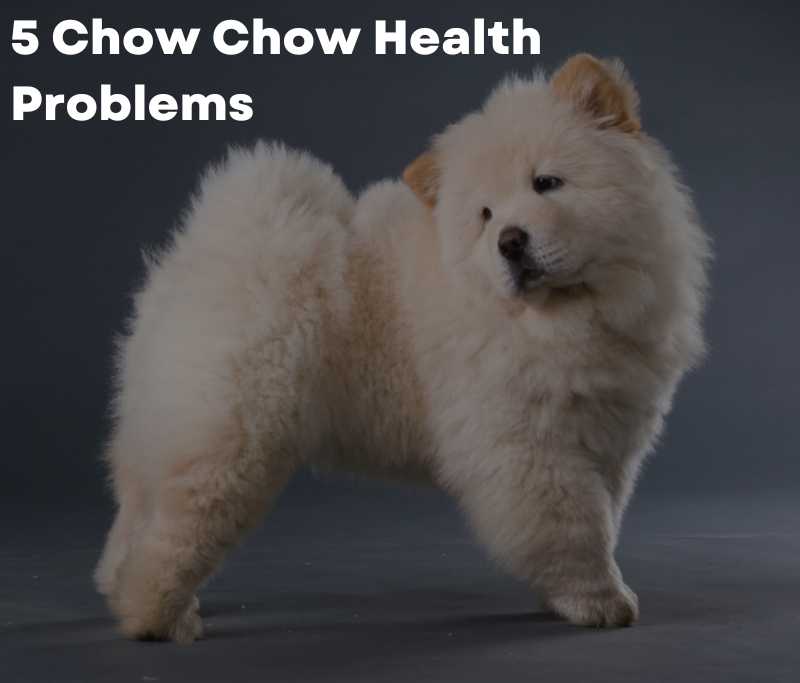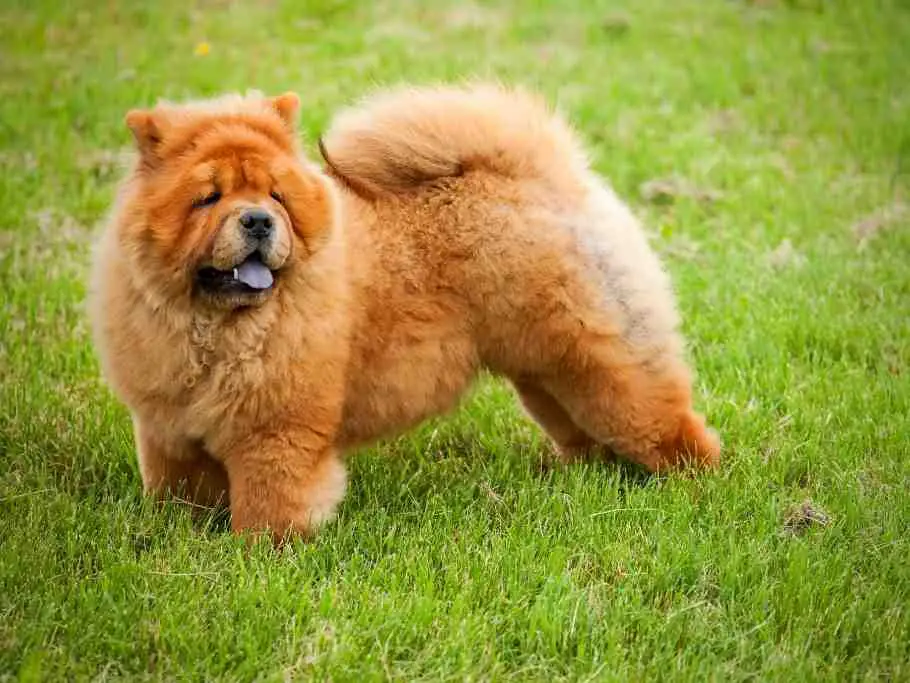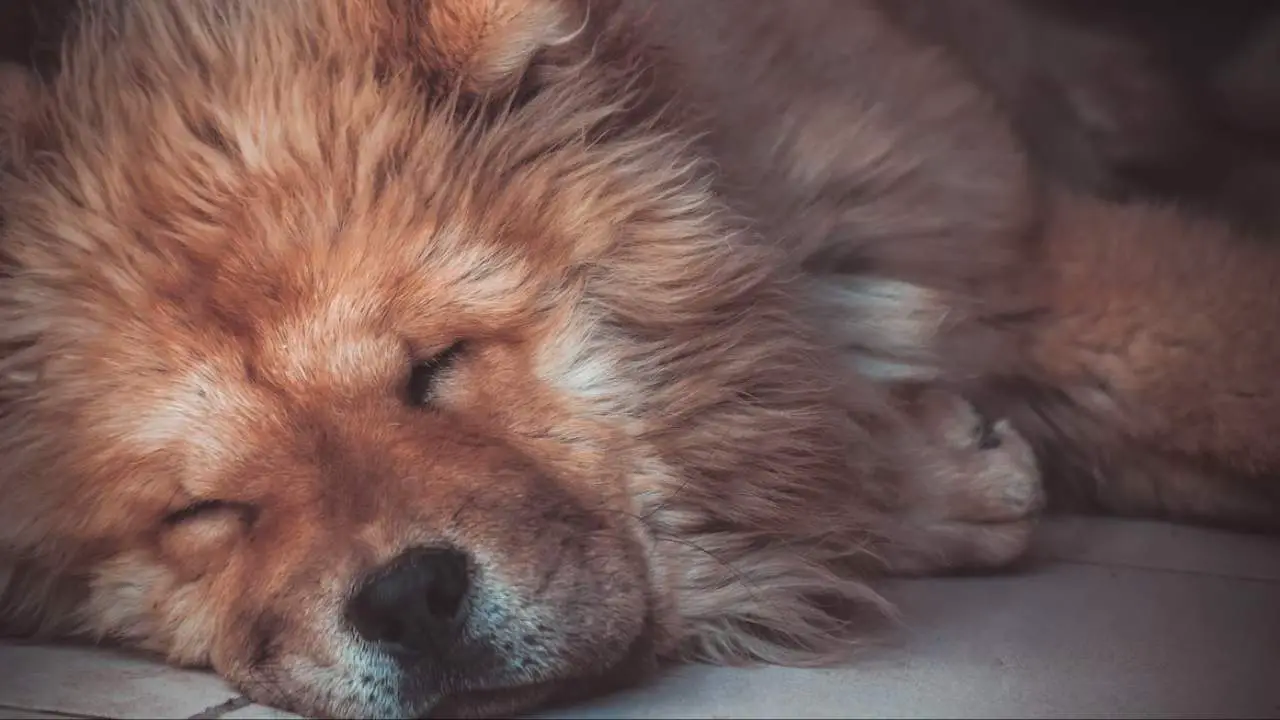Have you wondered which diseases Chow Chows are prone to? As a dog owner, you must be aware of the diseases your dog is prone to so that you can be prepared to deal with those diseases if your Chow Chow is affected by them.
Seeing your Chow Chow suffer while you have no idea what they may be experiencing and how to help them can be frustrating. To help you in such situations, we have compiled a list of the diseases Chow Chows are susceptible to.
Table of Contents
What Diseases Are Chow Chows Prone To?
Chow Chows are susceptible to diseases such as hip dysplasia, diabetes, cataracts, and various allergies. They are also prone to diseases that deep-chested dog breeds are susceptible to, such as Gastric Dilatation and Volvulus.
5 Chow Chow Health Problems

Chow Chow Joint Pain
Chow Chows are generally prone to joint pains after various conditions, such as arthritis. Arthritis is a condition that causes the joints to be worn down. Since joints are such crucial components for mobility, Chow Chows affected by arthritis tend to have difficulty moving around. They also experience joint pain; therefore, such conditions can significantly affect the quality of your Chow Chow’s life.
Various reasons, including age, weight, physical accidents or injuries, or hereditary conditions, could cause arthritis. Symptoms of arthritis include stiffness, reluctance to climb or descend stairs, general exhaustion, slower movements during walks, and tiring easily. When a Chow Chow is affected by joint pains, they generally prefer to lie down or sit rather than stand.
The treatment for joint pains could be as simple as some lifestyle changes to lose weight, such as a diet change and increased exercise. In some situations, your veterinarian may perform tests to determine whether your Chow Chow is eligible for medication.
Eye Issues
Chow Chows may be prone to various types of eye conditions. Some common Chow Chow eye issues are cataracts and entropion. Cataracts can develop in Chow Chows of multiple ages for different reasons. These reasons can include genetic inheritance, physical trauma, inflammation of the vascular tissue, and diabetes.
Cataracts manifest in a white cloud on the eye. Several dogs experience limited vision, while others lose their eyesight completely. Some symptoms of cataracts include a white cloud on the eyes, difficulty seeing, clumsiness, reluctance to descend or climb stairs, and rubbing of the eyes. Surgery is usually implemented as the primary treatment form in more advanced stages of cataracts.
Entropion is an eye condition that entails the eyelid rolling forward, causing the hairs to rub onto the eye. It causes significant irritation of the eye. Chow Chows affected by entropion tend to scratch their eyes excessively. Symptoms include excessive tearing, eye redness, squinting, and constant blinking.
Diabetes
When your Chow Chow’s body cannot convert the food it eats into energy, it means they are affected by Diabetes. The insulin-producing cells in the body of a Chow Chow affected by diabetes are destroyed; therefore, the body cannot produce insulin. The inability to produce insulin will result in an inability to control blood sugar levels.
The symptoms of diabetes are lethargy, impaired vision, weakness in the legs, decreased fur coat quality, and weight fluctuation. Chow Chows affected by diabetes generally drink more water, eat significantly more and urinate more frequently. If you notice a combination of these symptoms in your Chow Chow, you should contact your veterinarian as soon as possible.
Your veterinarian will conduct a series of tests on your Chow Chow to determine whether it has diabetes and the severity of its condition. Treatment depends on the severity of the condition, and the premise of diabetes treatment is the management of your Chow Chow’s blood sugar levels. Your veterinarian will implement insulin injections or change to a more therapeutic diet.
Hip Dysplasia
Hip dysplasia is a hereditary health condition that causes improper joint development. The hip joint is comprised of a socket and a ball. Dogs affected by hip dysplasia tend to experience the ball slip out of the socket. Chow Chows are large and relatively heavy dogs, so their weight can be much for their joints. This fact leads to Chow Chows being prone to hip dysplasia.
You can watch out for several symptoms to conclude whether your Chow Chow has hip dysplasia. These symptoms include hip pain, limping, limited range of movement—reluctance to climb stairs, and hind lameness. If your Chow Chow has an advanced case of hip dysplasia, they may find it significantly challenging to run at all.
Treatment for hip dysplasia is surgery. The early your Chow Chow’s hip dysplasia is detected and diagnosed, the more likely and better your Chow Chow may recover.
Allergies
Chow Chow is prone to various allergies, including pollen, latex, food, grass, and fleas. The most common allergy is a food allergy. Chow Chow is specifically allergic to the protein in some food items. However, they are not allergic to entire food items but to ingredients. You can implement the elimination method to pinpoint the source of the allergic reaction.
Some indications of allergies include discolored nasal discharge, wrenching, diarrhea, ear infection, constant scratching, and sores. A severe symptom to watch out for is difficulty breathing; once your Chow Chow begins to develop breathing issues, you should take them to your veterinarian as soon as possible.
Chow Chow’s Behavior Issues
Chow Chows are challenging dogs to own, especially novice dog owners, and they are endlessly stubborn and independent. If Chow Chows are trained haphazardly, they may grow up to be aggressive toward you, strangers, and other dogs. However, if they are raised in a loving home and with a firm hand, they may end up as affectionate dogs.
Chow Chows are usually aloof, but with early socialization, they will be friendly toward others. To train a Chow Chow effectively, you should be patient and establish yourself as the dominant figure.

Why Do Chow Chows Have Health Problems?
Yes, Chow Chows have health problems. They are susceptible to hip dysplasia, a hip joint deformation that can lead to arthritis. Chows are also prone to patella luxation, which is a condition that leads to the loosening of the knee joint. Patella luxation is a genetic condition that can vary in severity.
Are Chow Chows Healthy?
Despite being prone to several health conditions, Chow Chows are generally among the healthier dogs. All dogs are prone to issues irrespective of how healthy they are. To ensure that your Chow Chow remains healthy, they should have a balanced diet and exercise daily.
FAQ
What Is The Life Expectancy Of A Chow Chow Dog?
The life expectancy of a Chow Chow dog is between 8 to 12 years. However, when Chow Chows have a healthy lifestyle, they have been known to live up to 15 years.
Do Chow Chows Get Sick Easily?
No, Chow Chows do not get sick easily, and most of the health issues they are prone to are hereditary. Hence, despite their genetic conditions, Chow Chows are generally healthy dogs.
Conclusion
Chow Chows are prone to several health issues which can cause permanent damage if not detected early enough, so you should take your Chow Chow for regular health check-ups. You should also ensure that you remain informed regarding the various health issues that Chow Chows are prone to.
By doing this, you will be able to identify the multiple symptoms your Chow Chow may display. If you are unsure of the disease your Chow Chow is affected by, consult a veterinarian for a professional opinion.


